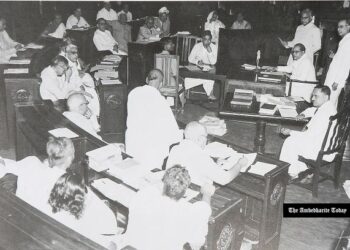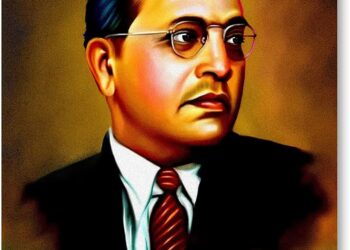Paper read before the Anthropology Seminar of Dr. A. A. Goldenweizer at The Columbia University, New York, U.S.A. on 9th May 1916
(Continuing from the previous issue)
I first propose to handle the law-giver of India. Every country has its law-giver, who arises as an incarnation (avatar) in times of emergency to set right a sinning humanity and give it the laws of justice and morality. Manu, the law-giver of India, if he did exist, was certainly an audacious person. If the story that he gave the law of caste be credited, then Manu must have been a dare-devil fellow and the humanity that accepted his dispensation must be a humanity quite different from the one we are acquainted with. It is unimaginable that the law of caste was given. It is hardly an exaggeration to say that Manu could not have outlived his law, for what is that class that can submit to be degraded to the status of brutes by the pen of a man, and suffer him to raise another class to the pinnacle? Unless he was a tyrant who held all the population in subjection it cannot be imagined that he could have been allowed to dispense his patronage in this grossly unjust manner, as may be easily seen by a mere glance at his “Institutes”. I may seem hard on Manu. but I am sure my force is not strong enough to kill his ghost. He lives, like a disembodied spirit and is appealed to, and I am afraid will yet live long. One thing I want to impress upon you is that Manu did not give the law of Caste and that he could not do so. Caste existed long before Manu. He was an upholder of it and therefore philosophised about it, but certainly he did not and could not ordain the present order of Hindu Society. His work ended with the codification of existing caste rules and the preaching of Caste Dharma. The spread and growth of the Caste system is too gigantic a task to be achieved by the power or cunning of an individual or of a class. Similar in argument is the theory that the Brahmins created the Caste. After what I have said regarding Manu, I need hardly say anything more, except to point out that it is incorrect in thought and malicious in intent. The Brahmins may have been guilty of many things, and I dare say they were, but the imposing of the caste system on the non Brahmin population was beyond their mettle. They may have helped the process by their glib philosophy, but they certainly could not have pushed their scheme beyond their own confines. To fashion society after one’s own pattern! How glorious! How hard! One can take pleasure and eulogize its furtherance, but cannot further it very far. The vehemence of my attack may seem to be unnecessary; but I can assure you that it is not uncalled for. There is a strong belief in the mind of orthodox Hindus that the Hindu Society was somehow moulded into the framework of the Caste System and that it is an organization consciously created by the Shastras. Not only does this belief exist, but it is being justified on the ground that it cannot but be good, because it is ordained by the Shastras and the Shastras cannot be wrong. I have urged so much on the adverse side of this attitude, not because the religious sanctity is grounded on scientific basis, nor to help those reformers who are preaching against it. Preaching did not make the caste system neither will it unmake it. My aim is to show the falsity of the attitude that has exalted religious sanction to the position of a scientific explanation.
Thus the great man theory does not help us very far in solving the spread of castes in India. Western scholars, probably not much given to heroworship, have attempted other explanations. The nuclei, round which have “formed” the various castes in India, are, according to them: (1) occupation; (2) survivals of tribal organizations etc.; (3) the rise of new belief; (4) crossbreeding and (5) migration.
The question may be asked whether these nuclei do not exist in other societies and whether they are peculiar to India. If they are not peculiar to India, but are common to the world, why is it that they did not “form” caste on other parts of this planet? Is it because those parts are holier than the land of the Vedas, or that the professors are mistaken? I am afraid that the latter is the truth.
In spite of the high theoretic value claimed by the several authors for their respective theories based on one or other of the above nuclei, one regrets to say that on close examination they are nothing more than filling illustrations— what Matthew Arnold means by “the grand name without the grand thing in it”. Such are the various theories of caste advanced by Sir Denzil Ibbetson, Mr. Nesfield, Mr. Senart and Sir H. Risley. To criticise them in a lump would be to say that they are a disguised form of the Petitio Principii of formal logic. To illustrate : Mr. Nesfield says that “function and function only…was the foundation upon which the whole system of Castes in India was built up”.
But he may rightly be reminded that he does not very much advance our thought by making the above statement, which practically amounts to saying that castes in India are functional or occupational, which is a very poor discovery! We have yet to know from Mr. Nesfield why is it that an occupational group turned into an occupational caste? I would very cheerfully have undertaken the task of dwelling on the theories of other ethnologists, had it not been for the fact that Mr. Nesfield’s is a typical one.
Without stopping to criticize those theories that explain the caste system as a natural phenomenon occurring in obedience to the law of disintegration, as explained by Herbert Spencer in his formula of evolution, or as natural as “the structural differentiation within an organism”—to employ the phraseology of orthodox apologists—, or as an early attempt to test the laws of eugenics—as all belonging to the same class of fallacy which regards the caste system as inevitable, or as being consciously imposed in anticipation of these laws on a helpless and humble population, I will now lay before you my own view on the subject.




